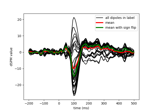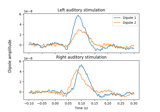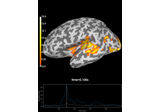mne.minimum_norm.apply_inverse_epochs#
- mne.minimum_norm.apply_inverse_epochs(epochs, inverse_operator, lambda2, method='dSPM', label=None, nave=1, pick_ori=None, return_generator=False, prepared=False, method_params=None, use_cps=True, verbose=None)[source]#
Apply inverse operator to Epochs.
- Parameters:
- epochs
Epochsobject Single trial epochs.
- inverse_operator
dict Inverse operator.
- lambda2
float The regularization parameter.
- method“MNE” | “dSPM” | “sLORETA” | “eLORETA”
Use minimum norm, dSPM (default), sLORETA, or eLORETA.
- label
Label|None Restricts the source estimates to a given label. If None, source estimates will be computed for the entire source space.
- nave
int Number of averages used to regularize the solution. Set to 1 on single Epoch by default.
- pick_ori
None| “normal” | “vector” Options:
NonePooling is performed by taking the norm of loose/free orientations. In case of a fixed source space no norm is computed leading to signed source activity.
"normal"Only the normal to the cortical surface is kept. This is only implemented when working with loose orientations.
"vector"No pooling of the orientations is done, and the vector result will be returned in the form of a
mne.VectorSourceEstimateobject.
- return_generatorbool
Return a generator object instead of a list. This allows iterating over the stcs without having to keep them all in memory.
- preparedbool
If True, do not call
prepare_inverse_operator().- method_params
dict|None Additional options for eLORETA. See Notes of
apply_inverse().New in version 0.16.
- use_cpsbool
Whether to use cortical patch statistics to define normal orientations for surfaces (default True).
Only used when the inverse is free orientation (
loose=1.), not in surface orientation, andpick_ori='normal'.New in version 0.20.
- verbosebool |
str|int|None Control verbosity of the logging output. If
None, use the default verbosity level. See the logging documentation andmne.verbose()for details. Should only be passed as a keyword argument.
- epochs
- Returns:
- stc
listof (SourceEstimate|VectorSourceEstimate|VolSourceEstimate) The source estimates for all epochs.
- stc
See also
apply_inverse_rawApply inverse operator to raw object.
apply_inverseApply inverse operator to evoked object.
Examples using mne.minimum_norm.apply_inverse_epochs#

Compute MNE-dSPM inverse solution on single epochs

Computing source timecourses with an XFit-like multi-dipole model
